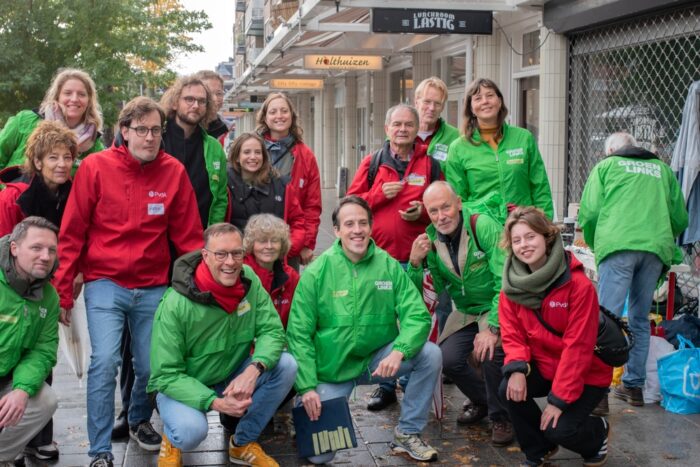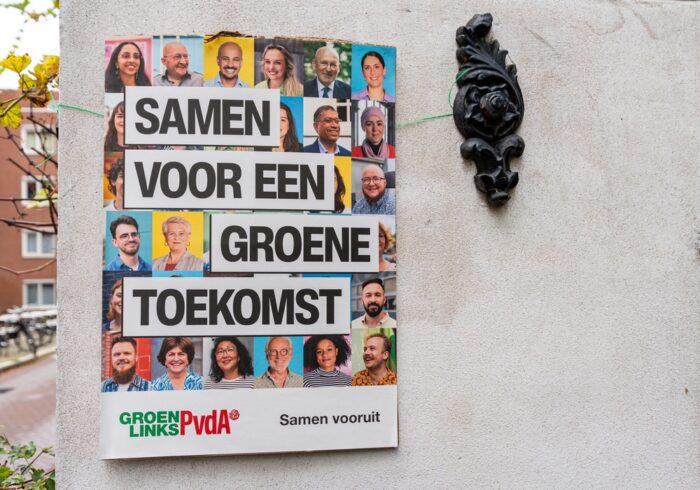Find all related Progressive Post
Progressive Post

The general elections in Austria last Sunday are an additional puzzle stone of the bigger Trend of right-wing extremism getting strong in Europe and globally. Interest in this election in Europe was huge, as Austria’s national politics has been very volatile in the last few years. Governments failed, Prime Ministers changed quickly, and former politicians faced corruption investigations. The threat of having another anti-European right-wing populist sitting in the European Council is real, but in this case, it could be a real hard-core right-winger.
The far-right FPÖ (PfE) obtained 29 per cent of the votes and is the clear winner of the elections. The ÖVP (EPP), receiving 26.3 per cent, will be the second biggest party in the national parliament but had to face massive losses (minus 11 per cent). The SPÖ came in third with 21.1 per cent, losing about 0.1 per cent, but still gaining one more seat in the parliament. For the SPÖ, it was the worst electoral result, after having been the strongest party for many years in the past. Compared to the European elections earlier this year, the party lost 2 percentage points. The Greens, like their coalition partner ÖVP, suffered major losses. The liberal NEOS (Renew) did quite well. The analysis shows that the Social Democratic party lost to the non-voters and gained from the Greens. The top five most discussed issues during the campaign were inflation, migration, health and care, preserving our democracy, war and international security.
Overall dissatisfaction and a desire for change characterised the mood in this election: when asked about Austria’s development over the last five years, almost six out of ten people saw a negative trend. In this election, the FPÖ was best able to translate this mood into votes. Given such circumstances, low trust in the government, and the set of topics like high prices, the SPÖ (being in opposition) should have gained most of those votes – but did not. SPÖ had a five-year period of leadership crisis and internal discussions. The new party chair, Andreas Babler. has chosen a leftist, polarising line of addressing inequalities, demanding a strong redistribution, wealth tax and working time reduction to 32 hours. The ÖVP and their prime minister, Karl Nehammer, presented themselves as centrists and the ones able to avoid the far fight to gain power under a prime minister Herbert Kickl – the FPÖ’s current leader. This came although in some major Austrian federal states, the ÖVP governs together with the FPÖ. And, from 2017 to 2019, they governed together on the national level. In addition, both parties had a very similar electoral program.
Now, difficult coalition talks and negotiations lie ahead. Despite its victory, the FPÖ will struggle to find a partner – the ÖVP has ruled out a coalition with FPÖ leader Kickl. The SPÖ has ruled out a coalition with the FPÖ altogether. Theoretically, an ÖVP/SPÖ coalition is possible, but with a very thin majority of one or two seats (final results pending). Other options are an ÖVP/SPÖ/GRÜNE coalition and an ÖVP/SPÖ/NEOS coalition. Commenting on the coalition talks, President Van der Bellen said he wanted to ensure that the cornerstones of our liberal democracy are respected: rule of law, separation of powers, human and minority rights, independent media and Austria’s EU membership. This can be read as an expression of his reservations about the FPÖ joining the government.
The SPÖ is ready and willing to take responsibility for the country and is prepared to enter open exploratory talks for future coalition negotiations. For now, it is on the ÖVP to say whether they want to govern with the SPÖ and one further party (Greens or NEOS) or if they choose the anti-EU, anti-establishment and Orbán-like way with the far-right FPÖ, after they might change their leader.
No easy months lay ahead for the Austrian Social Democracy. Still, the party is not unified, and the polarising left rhetoric of the election campaign might not fit with the reality of being a junior partner in a coalition. However, sitting in opposition and having the country in the hands of an extreme right and right-wing government is also not good – neither for the citizens, nor the party. Austrian Social Democrats have to face the reality, the party’s crisis is not over, and the SPÖ has to find a way to combine social justice with modernising the country. A lot has to be analysed. Vienna was the only place where SPÖ had an increase of votes. In Vienna, the SPÖ received 30 per cent, and the capital is the province with the most Social Democratic votes. Without this result, the countrywide result would be even worse. While the SPÖ got ranked third nationwide and in most provinces, in major cities, the SPÖ is in the lead. There is a clear differentiation between urban and rural areas in voting preferences. Another interesting detail is that the SPÖ did get a significantly better result at the last two European Elections than at the last two national elections.
What would an FPÖ government mean to the country and Europe? Austria’s government would be more Orbán-style than pro-European. The public institutions, which already suffered much from the recent ÖVP-FPÖ government of Sebastian Kurz, will be even more destroyed and radically reshaped. The historically successful Austrian tradition of strong social security and an economic policy driven by social partnership will end and lead to less fairness, more social conflicts, lower incomes and more strikes.
An alternative government, probably formed by ÖVP, SPÖ, and maybe liberals or Greens has also to face its challenges clearly. It will only be accepted, if it will work on implementing a set of concrete lighthouse projects. Each party has to walk a long (and rocky) read, away from their electoral rhetoric to find a handful of pragmatic projects. This will be most difficult and dangerous for the SPÖ – as they will be ‘only’ the junior partner, and they have some very pronounced demands.
Photo credits: Ivan Radic CC 2.0
| Cookie | Duration | Description |
|---|---|---|
| cookielawinfo-checkbox-advertisement | 1 year | Set by the GDPR Cookie Consent plugin, this cookie is used to record the user consent for the cookies in the "Advertisement" category . |
| cookielawinfo-checkbox-analytics | 11 months | This cookie is set by GDPR Cookie Consent plugin. The cookie is used to store the user consent for the cookies in the category "Analytics". |
| cookielawinfo-checkbox-functional | 11 months | The cookie is set by GDPR cookie consent to record the user consent for the cookies in the category "Functional". |
| cookielawinfo-checkbox-necessary | 11 months | This cookie is set by GDPR Cookie Consent plugin. The cookies is used to store the user consent for the cookies in the category "Necessary". |
| cookielawinfo-checkbox-others | 11 months | This cookie is set by GDPR Cookie Consent plugin. The cookie is used to store the user consent for the cookies in the category "Other. |
| cookielawinfo-checkbox-performance | 11 months | This cookie is set by GDPR Cookie Consent plugin. The cookie is used to store the user consent for the cookies in the category "Performance". |
| csrftoken | past | This cookie is associated with Django web development platform for python. Used to help protect the website against Cross-Site Request Forgery attacks |
| JSESSIONID | session | The JSESSIONID cookie is used by New Relic to store a session identifier so that New Relic can monitor session counts for an application. |
| viewed_cookie_policy | 11 months | The cookie is set by the GDPR Cookie Consent plugin and is used to store whether or not user has consented to the use of cookies. It does not store any personal data. |
| Cookie | Duration | Description |
|---|---|---|
| __cf_bm | 30 minutes | This cookie, set by Cloudflare, is used to support Cloudflare Bot Management. |
| S | 1 hour | Used by Yahoo to provide ads, content or analytics. |
| sp_landing | 1 day | The sp_landing is set by Spotify to implement audio content from Spotify on the website and also registers information on user interaction related to the audio content. |
| sp_t | 1 year | The sp_t cookie is set by Spotify to implement audio content from Spotify on the website and also registers information on user interaction related to the audio content. |
| Cookie | Duration | Description |
|---|---|---|
| CONSENT | 2 years | YouTube sets this cookie via embedded youtube-videos and registers anonymous statistical data. |
| iutk | session | This cookie is used by Issuu analytic system to gather information regarding visitor activity on Issuu products. |
| s_vi | 2 years | An Adobe Analytics cookie that uses a unique visitor ID time/date stamp to identify a unique vistor to the website. |
| Cookie | Duration | Description |
|---|---|---|
| NID | 6 months | NID cookie, set by Google, is used for advertising purposes; to limit the number of times the user sees an ad, to mute unwanted ads, and to measure the effectiveness of ads. |
| VISITOR_INFO1_LIVE | 5 months 27 days | A cookie set by YouTube to measure bandwidth that determines whether the user gets the new or old player interface. |
| YSC | session | YSC cookie is set by Youtube and is used to track the views of embedded videos on Youtube pages. |
| yt-remote-connected-devices | never | YouTube sets this cookie to store the video preferences of the user using embedded YouTube video. |
| yt-remote-device-id | never | YouTube sets this cookie to store the video preferences of the user using embedded YouTube video. |
| yt.innertube::nextId | never | This cookie, set by YouTube, registers a unique ID to store data on what videos from YouTube the user has seen. |
| yt.innertube::requests | never | This cookie, set by YouTube, registers a unique ID to store data on what videos from YouTube the user has seen. |
| Cookie | Duration | Description |
|---|---|---|
| COMPASS | 1 hour | No description |
| ed3e2e5e5460c5b72cba896c22a5ff98 | session | No description available. |
| loglevel | never | No description available. |


